Interesting Statistics Regarding Gas and Bloating
- Almost everyone feels gassy and bloated sometimes.
- Bloating is common throughout the world.
- Nearly 18% of the general population experiences bloating at least once per week.
- Anecdotal evidence links older age to increased gas production.1
- Nearly 1 in 7 Americans experience bloating on a weekly basis, and most aren't seeking professional care for it.2
- Bloating is more common in women (19.2%) than men (10.5%).3
- In 2017 the market for OTC gas remedies “simethicone” was $687.8 million and expected to increase by an additional $267.2 million by 2027.4
Definition of Gas and Bloating
 Intestinal gas, or just “gas” as it is more commonly known, is air in your digestive system. It is a natural and normal byproduct of digestion, which is the process your body goes through to break down food into smaller molecules/nutrients that your body can absorb. Your body releases gas through your mouth when you belch (burp) or through your anus when you “break wind” (pass gas, fart or have flatulence).5
Intestinal gas, or just “gas” as it is more commonly known, is air in your digestive system. It is a natural and normal byproduct of digestion, which is the process your body goes through to break down food into smaller molecules/nutrients that your body can absorb. Your body releases gas through your mouth when you belch (burp) or through your anus when you “break wind” (pass gas, fart or have flatulence).5
Being gassy does not always feel natural or normal, especially when too much gas gets trapped in your gut. Excess gas can cause abdominal pain, cramping or a feeling of fullness or tightness (bloating). Your belly may feel like an overinflated balloon on the verge of popping. Some people feel so tight and full, they describe feeling like they are pregnant. Burping or farting can provide much needed relief as the excess air seeps out.
Intestinal gas is a fact of life, a natural result of food digestion. Everyone feels gassy now and then. Most of us fart up to 20 times a day. In fact, some people burp up to 30 times a day. Many people experience farting and/or burping frequently and wonder why it happens so often.
Causes of Gas and Bloating
Gas is a natural part of digestion. Everyone has gas inside their stomach and intestine at all times. When you eat, you swallow small amounts of air that stay in your digestive system until you pass gas. Also, harmless bacteria in your large intestine break down food during digestion, releasing gas as a byproduct. This process is responsible for most gas you pass when you fart.
Gas is not a medical issue for most people. But it can feel especially worrisome if you have excess gas, foul-smelling gas, or gas pain. Here’s why gas sometimes causes gas pain:
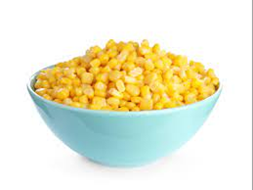 You are swallowing too much air.You may be gulping in too much air while chewing or drinking. Talking during meals can cause you to swallow more air. Chewing gum, drinking through a straw, sucking hard candy, smoking, or wearing loose-fitting dentures can all cause you to swallow more air.
You are swallowing too much air.You may be gulping in too much air while chewing or drinking. Talking during meals can cause you to swallow more air. Chewing gum, drinking through a straw, sucking hard candy, smoking, or wearing loose-fitting dentures can all cause you to swallow more air. - You are consuming too many gas-producing foods/drinks. Many foods that make you gassy are good for you. The downside is that they can cause gas and (sometimes) gas pain. Culprits include beans, potatoes, corn, onions, apples, and high-fiber foods in general. Foods high in sulfur, like proteins and cruciferous vegetables (like cauliflower, cabbage, and broccoli), are usually the cause of foul-smelling gas.
 You are consuming carbonated beveragesSoda, beer, energy drinks, and carbonated waters increase stomach gas.
You are consuming carbonated beveragesSoda, beer, energy drinks, and carbonated waters increase stomach gas.- You are consuming fiber supplements. Many fiber supplements contain psyllium, such as Metamucil, this may cause an increase in colon gas.
- You are not digesting your food well. If the food you are eating is not broken down properly in the stomach it can cause lots of gas and bloating through your gastrointestinal system.
- You are overeating. When we eat too much at one time it can cause us to feel extremely full and bloated.
- You have an infection Infections in your intestines can cause an overgrowth of bacteria that make you gassy. An overgrowth of bacteria in your small intestine (SIBO) can also lead to excess gas. Bacterial overgrowths can cause other symptoms, like diarrhea and weight loss, which require treatment.
- You have a digestive system condition. Conditions like irritable bowel syndrome (IBS), celiac disease and lactose intolerance can overwork your digestive system or lead to slowdowns that cause excess gas. Constipation can cause poop and gas to get stuck in your intestine.
- You are taking medicine that slows your bowels. A digestive system that moves more slowly creates more of an opportunity for gas to build up in your gut. Certain digestive system conditions can slow your bowels, and so can some medications. Certain medicines can also disrupt the bacteria balance in your intestine and thus lead to the formation of gas in the intestine.
- Cancer / cancer treatment. Having cancer or being in the process of cancer treatment can also cause bloating. That is why it is important to see your doctor if you have chronic issues with gas and bloating.
Symptoms of Gas and Bloating
Most people recognize the telltale signs of excess gas: feeling like you need to burp or break wind (fart). It can be embarrassing when it happens unexpectedly, but it is usually nothing to worry about.
When excess gas gets trapped in your gut, the feeling can range from mild abdominal discomfort to outright abdominal pain. The experience is not always confined to one part of your abdomen, either. Trapped gas can feel like pain or pressure in various locations throughout the abdomen, sometimes people will even feel gas up in the chest region.
Gas pain can feel like:
- Tenderness, fullness, or pressure (bloating) in your abdomen (sometimes, your belly looks visibly larger, or distended).
- A sharp, stabbing pain or a dull ache in your abdomen.
- Pain, pressure, or discomfort on your right or left side (flank pain).
- Pain, pressure, or discomfort in your upper or lower back.
- Pain, pressure, or discomfort in your chest.
These symptoms can feel confusing because more serious conditions affecting your organs can cause similar pain and discomfort. Gas trapped on your left side can cause chest pain that is easy to mistake for a heart attack. Gas trapped on your right side can mimic pain from gallstones if in the right upper abdomen, or appendicitis if in the right lower abdomen.
If you have any questions at all about whether the pain you’re experiencing is gas or a serious condition, see a healthcare provider.
Although gas pain is usually harmless, it can signal a genuine problem with your digestive system. If you are experiencing excess gas or gas pain along with any of the following symptoms, don’t dismiss it. See a healthcare provider.
Symptoms to be on the lookout for, alongside gas pain, include:
- Fever.
- Nausea and vomiting.
- Unexplained weight loss.
- A change in bowel habits, i.e., sudden onset of diarrhea or constipation.
- Rectal bleeding, bloody stool (poop) or fatty stool (yellow, greasy-looking, and foul-smelling).
How Chronic Gas and Bloating is Diagnosed
Although gas and bloating are common symptoms, patients may not bring it up with their doctors. Some of the reasons they gave for not seeking care were that the bloating resolved on its own (32.5%), it wasn’t bothersome (29.9%), they were able to manage it with over-the-counter medications or lifestyle changes (20.8%), they didn’t have health insurance (10.2%) or time to go to the doctor (9%), or they were embarrassed and/or just not comfortable discussing bloating with a healthcare provider (8.5%).
How are intestinal gas and gas pain diagnosed?
Your healthcare provider will perform a physical exam and ask about your symptoms and current medications. They may ask you to keep a food diary for a few weeks or more to see if certain foods or drinks make you gassy. Usually, this is all it takes to determine what’s causing gas pain.
If your provider suspects excess gas may signal an underlying health condition, you may need one or more of these tests:

- Blood tests: These tests detect certain conditions, like celiac disease, that cause gas.
- Breath test: Special breath tests identify lactose intolerance or abnormal bacterial growth in your intestine.
- Colon screening: A colonoscopy allows your provider to view all your large intestine. These tests help identify digestive disorders like Crohn’s disease and colon cancer.
- Food elimination:Your healthcare provider may suggest removing certain foods to see if gas symptoms improve. For example, if you’re less gassy after cutting out dairy, you may have lactose intolerance, which means you’re unable to break down lactose, a sugar in milk.
- Upper Gastrointestinal (GI) tract exam: If you burp a lot, your provider may perform a gastrointestinal exam called an upper GI test or barium swallow (esophagram). You swallow a solution that coats the esophagus, stomach, and the beginning part of the small intestine with barium for easier viewing on X-rays.
What is Gas Made Of
Most gas is made up of odorless vapors--carbon dioxide, oxygen, nitrogen, hydrogen, and sometimes methane. Bacteria in the large intestine release gases that contain sulfur and produce an unpleasant odor of flatulence.
Traditional Medical Treatment for Gas and Bloating
There is not a one-size-fits-all treatment for gas pain or excess gas. You may need to change what you eat or drink or take over-the-counter (OTC) anti-gas medications. You may have an underlying condition that your provider needs to treat. Your healthcare provider will try to find out what’s causing your gas issue, but sometimes the cause remains a mystery. Traditional medical treatment for gas and bloating consists of the following:
Consider changing your eating and drinking habits.
You can often treat or prevent gas pain by changing what you eat and drink.
- Cut back on high-fiber foods. Many foods containing carbohydrates cause gas, including foods that are good for you, like veggies, fruits, wheat, and beans. A food diary can help you determine which foods make you gassy. But do not cut out too much. You need fiber — just not so much that it is hurting your gut.
- Reduce or avoid carbonated (fizzy) drinks. The fizz from soda or pop feels fantastic when it is tickling your nose or the back of your throat, but it also adds extra air into your gut that can cause gas pain. If you are experiencing gas pain, avoiding carbonated beverages is a good idea. Instead, reach for water. It does not add air to your gut, and it also helps prevent constipation, another culprit that causes gas pain.
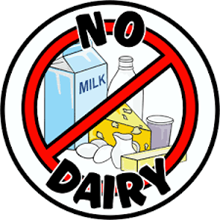 Cut back on dairy. Many people with excess gas learn they are lactose intolerant. You may need tests to determine if this is the case. In the meantime, cut back on dairy or try dairy-free substitutes to experiment and see how you feel.
Cut back on dairy. Many people with excess gas learn they are lactose intolerant. You may need tests to determine if this is the case. In the meantime, cut back on dairy or try dairy-free substitutes to experiment and see how you feel.- Try the low FODMAP diet. The low FODMAP diet substitutes carbohydrates that are difficult for your body to break down with more easily digestible alternatives. It also recommends avoiding alternatives for sugars (like fructose and artificial sweeteners) that can be tough on your gut and can also cause some of the gas.
Consider changing how you eat and drink.
- Avoid using straws, which introduce extra air into your gut.
- Avoid sucking on hard candy or chewing gum, which causes you to swallow more air.
- Don’t talk while you’re eating (or if that sounds miserable, try to talk less, so you’re not taking in as much air).
- Make sure your dentures or any mouthpieces fit correctly.
- Sit down for meals instead of eating on the go and chew your food slowly.
- Change your mealtime schedule so you eat smaller meals more frequently instead of a few larger ones.
Consider over-the-counter products.

- Alpha-galactosidase (Beano®), an enzyme that breaks down hard-to-digest foods.
- Bismuth subsalicylate (Pepto-Bismol®) for adults with upset stomachs and diarrhea.
- Lactase enzymes for lactose intolerance (a problem digesting milk sugars).
- Probiotics to get rid of bad gut bacteria.
- Simethicone (Gas-X®, Mylanta®, Phazyme®) to reduce intestinal gas buildup that causes bloating.
Prescription medications may help if you have an underlying condition affecting your digestive system, like IBS. Antibiotics can treat bacterial overgrowth in your intestines that cause excess gas and bloating.
Complications of Gas and Bloating
It would be impossible to prevent all gas and bloating. Gas in your gut is a fact of life. There is nothing more human than burping or passing gas (farting). You can however prevent gas pain by minding what you eat and drink. In some cases, you may have an underlying condition making you gassy that requires medical attention and treatment.
You should call your healthcare provider if you experience:
- Pain in your chest or abdomen that may signal a serious condition, like a heart attack.
- Gastrointestinal discomfort that does not happen during or shortly after you eat.
- Severe abdominal pain, diarrhea, or constipation.
- Tarry, black stool or rectal bleeding.
- Unexplained weight loss.
Painful gas and bloating are typically the first digestive issues you will feel when your digestive system is not working as it should. If untreated, it can get worse and progress into other more complicated digestive issues. There have also been studies that show gas and bloating occurs more regularly in older adults. Again, as the body is getting older, it is slowing down and not working at high capacity anymore. When this happens, the body is not digesting food like it should, causing gas and bloating. Again, if untreated these digestive issues will only get worse causing any combination of constipation, diarrhea, acid reflux, etc.
>What Traditional Medicine is Not Telling You About Gas and Bloating
The information I am about to share with you was not taught to me during any of my medical training. What medical school, internship, internal medicine residency, and my Gastroenterology fellowship taught me was how to diagnose symptoms, prescribe medicines and do amazing colonoscopies and upper endoscopies. What it did not teach was the true reason people are having symptoms to begin with. It is good to know that more natural approaches (like taking probiotics) are considered when treating gas and gloating, but there is more to it than that.
I do love that traditional medicine does acknowledge that gas and bloating are partly due to a bacteria imbalance in the gut. Our gut bacteria can get off very easily causing you to have too much bad bacteria and not enough healthy bacteria. When this happens it can cause gas, bloating, constipation, and diarrhea. It also makes it hard for you to digest, assimilate and absorb certain nutrients, vitamins, and minerals. There are specific bacteria in the gut that break down food properly and help it absorb into the body. Without enough healthy bacteria, this process does not happen. As stated above in traditional treatment, taking a daily probiotic is mentioned, which is great. The question is which probiotic and understanding that not all are created equal; more on this later.
I also love that traditional medicine acknowledges the issues people have with digesting dairy. Dairy causes inflammation and excess mucus in the intestine and body so if you are having gas and bloating, trying to eliminate dairy will help. I do want to mention that drinking Lactaid milk is still consuming dairy so if you’re looking for milk alternatives you need to go with things like almond milk, coconut milk, hemp milk, etc.
The thing is, it is not just dairy that people have problems digesting. The one cause of gas and bloating that does not get addressed enough by traditional medicine is the idea that in general we are not digesting our food well and as we age the problem gets worse. There is a reason this happens, and the best part is it can be resolved easily. The main reason we experience gas and bloating to begin with is we are not making enough digestive enzymes to break down our food.
There are two main reasons we are not producing enough digestive enzymes.
- As we age our enzyme production declines. We are not making all those great enzymes anymore to help us break down our food. This is why we start seeing patients in our office in their 40’s, 50’s and 60’s suddenly having issues with food. Patients will tell me all the time, they have never had a problem with food and now are having gas, bloating, even reflux out of the blue. To me, this is no longer a mystery.
- If we do not eat a nutritious well-balanced diet, we are not giving the body what it needs to produce a healthy number of digestive enzymes. I think we can all agree the Standard American Diet (SAD) leaves a lot to be desired. This is why we are seeing younger and younger patients in our office with the same digestive issues their parents and grandparents are experiencing. This is a generation of kids that have grown up on fast food, processed foods, fancy coffees, and energy drinks. /li>
Taking both issues into consideration, if we do not produce enough enzymes in our stomach when we eat, our food sits in our stomach longer than it should, putrefying and causing a whole lot of problems, mostly gas and bloating.
Traditional medicine will tell you that the easiest way to fix your gas and bloating is to take an over-the-counter medicine. The problem with over-the-counter medicine is it is just a band aid; it is not fixing anything. And the reason you are getting excess gas to begin with is because you are not digesting your food properly. Wouldn’t it be better to take something to digest your food better instead of just covering up the gas issue? Not digesting your food well over an extended period of time can affect a lot more than just your digestive health.
Why It is Important to Digest Your Food Properly
When you eat food, it goes into your stomach as a solid. Obviously, we chew it, but we do not chew it into a liquid. Your body cannot use food in a solid form, it must be broken down into a liquid for your body to benefit from it. This means when you eat, your body is supposed to go to work for you – making enzymes and acid. There is a different enzyme produced to digest all different types of foods:
- Amylase & Diastase - break down starch into sugars / glucose.
- Protease- breaks down protein into amino acids.
- Lipase- breaks down fat into fatty acids.
- Invertase - breaks sugar down into glucose and fructose.
- Lactase - breaks down sugar found in dairy products.
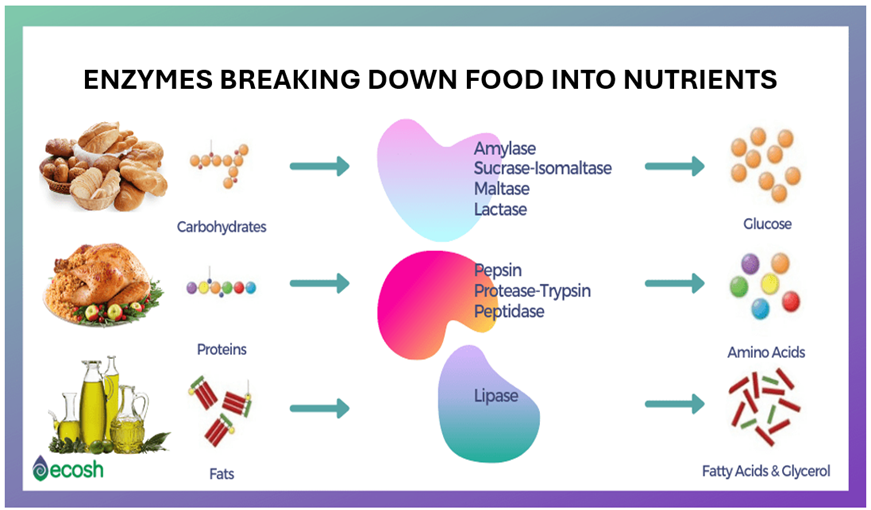
The acid that gets produced in the stomach helps to digest protein in addition to killing off germs, viruses or bugs found on our food. Our food is not sterile, so the acid helps to protect us from all the items we consume that the body should not be exposed to. Producing the appropriate amount of enzymes and acid is a crucial step in the digestive process. For your food to be absorbed and assimilated into the body, the food must be broken down properly. If you are lacking enzymes or acid, your food will sit around too long in the stomach causing a lot of digestive issues but in addition to that you will not be able to benefit from the food itself.
Imagine this – even if you are eating the healthiest diet in the world, if your body is not breaking it down properly, you are not benefiting from what you are eating. This can cause you to be tired, have low energy, have a foggy brain, etc. Is anyone out there experiencing any of these symptoms?
In addition, if you are not getting vitamins and minerals from the food you are eating, the body is very smart. It knows you need vitamins and minerals to function and so guess what it does, it starts to rob from itself. And the first place it goes is the bone and the muscle because that is where we have the most vitamins and minerals stored up.
Digesting your food properly is the first step to not only eliminating digestive issues but getting you off of over-the-counter and prescription meds while at the same time giving you your life back.
Long-Term Effects of Over-the-Counter Meds
The good thing about over-the-counter gas and bloating medicines is they are not going to harm the body in the long-term like some other digestive health medicines. They are merely covering up the problem instead of fixing it. However, not fixing the digestive issue over an extended period can and will cause further digestive issues. Gas and bloating are typically the first signs your digestive system is not working so great – take it as a sign to fix the problem to avoid future problems. If you truly want to be healthy, you must stop putting a band aid on the problem and start fixing it.
A Different Approach to Gas and Bloating
In 2007, I approached my wife and Office Manager Tina, and told her how frustrated I was with medicine. I was running all the tests, doing all the procedures, and prescribing all the medicines and could not figure out why my patients were still hurting. That frustration led us on a two-year journey to learn what my medical degree did not teach me about the body and how it works, in addition to learning and discovering what is happening in the medical industry, pharmaceutical industry and food industry to cause so many health problems in our world.
After we learned what we did, we felt obligated to share this with our patients and we have been doing so since 2010. Tina was so passionate about what we learned, she went back to school and received her Certificate in Holistic Nutrition so she could help me deliver this message to as many people as we possibly could. Since we started on this journey, we have helped tens of thousands of patients and wellness clients eliminate their symptoms naturally, helping their bodies work again like they were meant to work. And the best part of it all, is it is not as hard as you may think to turn it all around, no matter how long you’ve been suffering or how old you are. If you are willing to put in the time, effort and invest in yourself, you can have your life back too.
Because gas and bloating are the first digestive issues that present in people, it is also the easiest to solve.
Details on this approach are as follows:
 A Cellular Level Food Sensitivity Test Anyone struggling with gas and bloating absolutely must get this test done. There could be foods that you are eating on a regular basis that your body does not agree with and are causing you problems. Instead of elimination diets and the guessing game, this test will identify the foods that are causing you problems so we can get you off those foods temporarily, allowing the gut to heal. Once this is accomplished, food sensitivities are eliminated, you can reintroduce these foods back into your diet.
A Cellular Level Food Sensitivity Test Anyone struggling with gas and bloating absolutely must get this test done. There could be foods that you are eating on a regular basis that your body does not agree with and are causing you problems. Instead of elimination diets and the guessing game, this test will identify the foods that are causing you problems so we can get you off those foods temporarily, allowing the gut to heal. Once this is accomplished, food sensitivities are eliminated, you can reintroduce these foods back into your diet.
- Traditional allergists run skin and blood tests to determine food allergies. This food sensitivity test goes a level deeper to study the cellular level of the body, the difference between a food allergy and a food sensitivity.
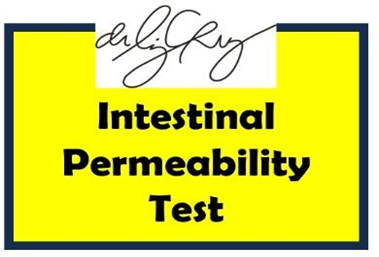 Intestinal Permeability Test This test will assess your urine to determine if there are microscopic tears “leaky gut” in the small bowel which allow partially digested food particles, viruses, bacteria, and toxins to enter the blood stream. This can lead to inflammation and changes with the gut bacteria that affect your gut health. Leaky gut is the number one cause of gas, bloating, and food allergies / sensitivities. It typically goes untreated because there is no traditional medical test to diagnose it.
Intestinal Permeability Test This test will assess your urine to determine if there are microscopic tears “leaky gut” in the small bowel which allow partially digested food particles, viruses, bacteria, and toxins to enter the blood stream. This can lead to inflammation and changes with the gut bacteria that affect your gut health. Leaky gut is the number one cause of gas, bloating, and food allergies / sensitivities. It typically goes untreated because there is no traditional medical test to diagnose it.
- When leaky gut is diagnosed, with the right treatment plan, it is one of the easiest things to recover from. Healing leaky gut is the most essential component to a healthy digestive system
- Digestive Enzymes As a recap, digestive enzymes help break down our food into smaller, more absorbable units. Your body cannot absorb the food you eat as is, it can only absorb nutrients. Therefore, for your body to benefit from what you eat, proteins need to be broken down into amino acids; fats need to be broken down into fatty acids and cholesterol; and carbohydrates need to be broken down into simple sugars. You rely on digestive enzymes to break down what you eat. One of the main reasons why we begin to suffer from gas and bloating is because we are lacking digestive enzymes, and our food sits around too long and moves on in chunks instead of it moving on as a liquid.
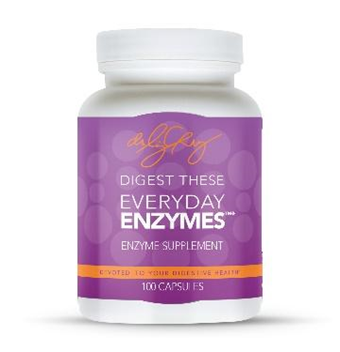 If you are enzyme deficient, you are not absorbing nutrients from your food, even if the food you are eating is extremely healthy
If you are enzyme deficient, you are not absorbing nutrients from your food, even if the food you are eating is extremely healthy- In addition to not being able to absorb nutrients from what you are eating, enzyme deficiency can also cause many digestive symptoms such as acid reflux, heartburn, indigestion, nausea and vomiting, constipation, and diarrhea.
- At birth we are given a certain potential for manufacturing enzymes in our body, creating an enzyme “reserve.” However, if we do not continually replenish that reserve through proper nutrition, it runs out. With every decade of life our enzyme production depletes by 13%.
- Our digestive enzymes are called Everyday Enzymes™. They are what I like to call medical grade enzymes (high potency and no fillers). This is important when taking a supplement, especially digestive enzymes. It is meant to be taken with meals to help you digest your food better. Remember, digesting your food properly is the first step to not only eliminating digestive issues (especially gas and bloating) but getting you off of over-the-counter and prescription meds while at the same time giving you your life back.
- Probiotics Your digestive system is home to trillions of microorganisms, creating an ecosystem called the “gut flora.” Probiotics are healthy bacteria, which are needed to create a balance throughout the body. The body has both good and bad bacteria. Without a healthy balance of good bacteria, symptoms may occur such as diarrhea, constipation, gas, and bloating.
 Daily, we unconsciously consume various microbes that could potentially cause sickness. In a body that has plenty of “good bacteria,” these microbes will pass with no negative effects.
Daily, we unconsciously consume various microbes that could potentially cause sickness. In a body that has plenty of “good bacteria,” these microbes will pass with no negative effects. - However, if bad microbes are ingested in a body with an imbalanced gut flora, these microbes will cause sickness. The “bad bacteria” that are constantly in our system, are kept under control by the “good bacteria.”
- Our probiotics are called Pleasant Probiotics™. These are also medical grade (high potency and no fillers). It contains six strains of bacteria and a lot of each strain; this cannot be said for most probiotics on the market. Our product also has a prebiotic which is food for bacteria. Probiotics are meant to be taken on an empty stomach. We dose ours one in the morning and one at night. Taking a healthy probiotic daily is one of the simplest things you can do, not only for your digestive health but your overall health.
- More than half of our immune system is in the gut, so it is vital to keep that part of our body healthy. Many illnesses can be linked back to abnormal gut flora.
-
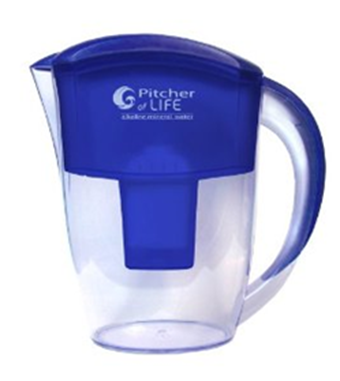 Alkaline Water The “alkaline” in alkaline water refers to its pH level. A pH level is a number that measures how acidic or alkaline a substance is on an approximate scale of 0 to 14. For example, something with a pH of 1 would be very acidic, and something with a pH of 13 would be very alkaline. Regular drinking water has a neutral pH of 7. Alkaline water typically has a pH of 8 or 9.
Alkaline Water The “alkaline” in alkaline water refers to its pH level. A pH level is a number that measures how acidic or alkaline a substance is on an approximate scale of 0 to 14. For example, something with a pH of 1 would be very acidic, and something with a pH of 13 would be very alkaline. Regular drinking water has a neutral pH of 7. Alkaline water typically has a pH of 8 or 9.
- Just like a fish tank or a swimming pool, our body needs to maintain a certain pH to stay healthy. If we get really sick in the hospital, our pH is monitored because if it drops below a certain amount we can die. When we are healthy, we do not pay much attention to our pH, but that does not mean it’s not important. On the pH scale, our body is slightly alkaline, so anything you can do to drink and eat more alkaline makes it easier for your body to maintain its alkalinity and in turn work to keep you healthy.
- Your body is a healing vessel, it wants you to be well. Sometimes we just need to help it out a little. Drinking alkaline water is one simple thing you can do to help your body out. It is especially helpful for people suffering from gas and bloating because it helps to maintain the acid alkaline balance in the stomach.
Act Now – 3 Options to Move in the Right Direction
Depending on your level of commitment and interest in turning around your gas and bloating issues, there are three options to consider:
- Good if you want to start slow and are not sure if this is for you, at least order our Everyday Enzymes™ and Pleasant Probiotics™. The investment is minimal, and it is not hard to incorporate these two supplements into your daily routine to see if they can help. I do encourage you to try this regimen for at least 3 months before you decide it is not working for you. Doing something for only a few days or even a month is not going to make a huge difference in your body, especially if you’ve been struggling with gas and bloating for a long time.
- Better if you are ready to make a more serious commitment to turning around your gas and bloating and have some money to invest in yourself, consider ordering our Gas and Bloating Starter Kit. It includes three months’ worth of our Everyday Enzymes™ and Pleasant Probiotics™, along with an Alkaline Water Pitcher so you can start benefiting from alkaline water right away. In addition, it also comes with the Cellular Level Food Sensitivity Test and the Intestinal Permeability Test I explained above. By purchasing the kit, you get all these items at a discounted rate so it is much better than buying them individually.
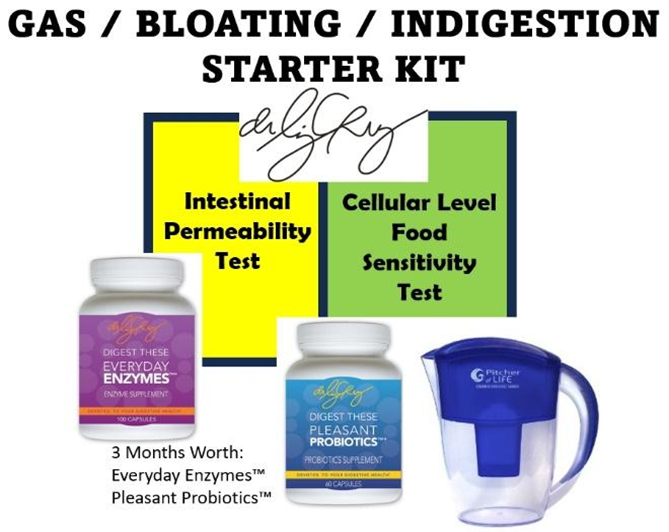
- Best if you have money to invest in yourself, are suffering from other medical issues aside from just gas and bloating and you are sick and tired of feeling sick and tired consider going all in on our Digestive Revolution™ Ultimate Plan. This is my 4-Step Proprietary System which is an outcomes and scientific based system that starts at the cellular level. The system delivers 4 main outcomes:
- Eliminates digestive issues such as gas, bloating, constipation, diarrhea, and acid reflux.
- Removes pain and inflammation from the body.
- Reduces the need for prescription and over-the-counter medications.
- Increases energy, enhances sleep, and the ability to get to your healthy base weight.

No matter what you decide to do, do something! You get sick and remain sick by accident – you get healthy on purpose!
References
[1] UCLA Health - https://www.uclahealth.org/news/many-people-become-more-flatulent-as-they-age#:~:text=It%20depends%20on%20variables%20such,at%20this%20time%20of%20life.
[2] Science Daily - https://www.sciencedaily.com/releases/2022/11/221123213555.htm
[3] Gastroenterology and Hepatology Peer Review Journal - https://www.ncbi.nlm.nih.gov/pmc/articles/PMC5350578/
[4] Technavio - Simethicone Market by Application - https://www.technavio.com/report/simethicone-market-analysis
[5] Cleveland Clinic - https://my.clevelandclinic.org/health/diseases/7314-gas-and-gas-pain
These statements have not been evaluated by the Food and Drug Administration.
These products are not intended to diagnose, treat, cure, or prevent any disease.

Liz Cruz, MD
- Award-winning, board-certified gastroenterologist
- Sought-after leader in solving complex digestive health conditions
- 30+ years of dedicated patient service
- Best-selling author, podcaster and international speaker
Dr. Liz Cruz was named Top Gastroenterologist in 2019. She is a Diplomat of the American Board of Internal Medicine and the American Board of Gastroenterology. Dr. Cruz is a member of the American Gastroenterological Association, American College of Gastroenterology, and the American Society for Gastrointestinal Endoscopy. In 2014, she received the Quilly Award from the National Academy of Best-Selling Authors® for her Best-Selling Book “Answering the Call".
